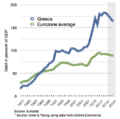Greek government-debt crisis facts for kids
The Greek government-debt crisis was a big economic problem that happened in Greece after the worldwide financial crisis of 2007–08. In Greece, people often called it The Crisis (in Greek: Η Κρίση). It started with sudden changes and tough rules, called "austerity measures," which meant the government spent less money. But these changes made many people poorer and caused them to lose money and land.
Greece's economy went through the longest period of decline (recession) ever seen in a modern rich country. It was even longer than the Great Depression in the United States. Because of this, many well-educated Greeks left the country to find work elsewhere.
When a country has a "trade deficit," it means it buys more goods from other countries than it sells. This means it has to borrow money. Greece's trade deficit and its "budget deficit" (when the government spends more than it collects in taxes) both grew a lot. They went from less than 5% of its total economic output (GDP) in 1999 to about 15% of GDP in 2008–2009. Investors thought Greece was a risky country to lend money to on its own. But they also believed that the EU would help Greece because it was a member of the Eurozone.
In 2009, reports came out that the Greek government was disorganized. This made it even more expensive for Greece to borrow money. Eventually, Greece could no longer borrow enough money to pay for its trade and budget deficits at a price it could afford.
How the Crisis Started
The Greek crisis was made worse by the Great Recession, a big economic slowdown around the world. This recession caused many Western countries to have huge budget deficits, sometimes more than 10% of their GDP. Greece already had a high budget deficit (10.2% of GDP in 2008 and 15.1% in 2009). At the same time, it had a very high amount of public debt compared to its GDP. This debt reached 127% of GDP in 2009, and Greece seemed unable to control it. Because Greece was part of the Eurozone, it couldn't easily change its own money policies to fix the problem.
What Caused the Problems
In January 2010, the Greek Ministry of Finance released a report called the Stability and Growth Program 2010. This report listed five main reasons for the crisis:
- The economy wasn't growing much.
- The government had too much debt and was spending too much.
- There were problems with following budget rules.
- The information about the country's finances wasn't always reliable.
Other experts also pointed to reasons like too much government spending, large trade deficits, and people avoiding or not paying their taxes.
Images for kids
-
Greece's debt percentage since 1977, compared to the average of the Eurozone
-
Former Prime Minister George Papandreou and former European Commission President José Manuel Barroso after their meeting in Brussels on 20 June 2011.
See also
 In Spanish: Crisis de la deuda soberana en Grecia para niños
In Spanish: Crisis de la deuda soberana en Grecia para niños
 | Anna J. Cooper |
 | Mary McLeod Bethune |
 | Lillie Mae Bradford |






